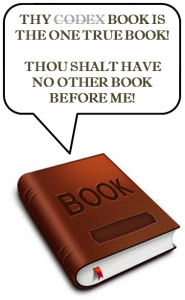 I much prefer paper codices to e-books, for a variety of reasons. (None of which have to do with smell, sorry.)
I much prefer paper codices to e-books, for a variety of reasons. (None of which have to do with smell, sorry.)
I certainly recognize the virtues of e-books, their ease of publication, their economy, their portability. And, looking at the walls of my apartment where over 70 percent of the perimeter is taken up by book-cases, I certainly appreciate the space considerations.
But, I still prefer paper books. And this is why it is so frustrating to watch paper fetishists work themselves into a lather coming up with dishonest and irrational arguments bolstering the superiority of the codex. It’s like being a Christian faced with Westboro Baptist extremism, or an environmentally conscious person faced with Greenpeace’s adolescent antics.
For example, it’s more than a little annoying when a book-lover like me reads anecdotal fluff like this passed off as “research”:
What fascinates me is how many people – from teenagers to millennials [sic] to those of a certain age – prefer print when reading both for pleasure and for school or work. Drawing examples from my own research, some of the reasons are aesthetic (“charm of actually turning pages” and “scent of a new book”). Others involve a sense of accomplishment (“able to see how much I read”), ease of annotation (“I can write on the pages”), and navigation (“easy to locate where I was”). In contrast, I hear abundant complaints about eye strain and headaches when using screens.
There’s some precision research for you: some of the reasons, others, abundant complaints. And, the uncritical way the author simply accepts this highly subjective testimony as demonstrative of objective causation is cringe-worthy. Let’s reserve the word “research” for serious study, okay?
That was from a Washington Post piece by Naomi S. Baron titled “The case against e-readers: Why reading paper books is better for your mind.” First, I am grateful that Baron—who is professor of linguistics and Executive Director of the Center for Teaching, Research, and Learning at American University—describes codices as “paper books” rather than “real books” or some other such elitist “people vs. tribes” trope.
But she is also identified as the author of Words Onscreen: The Fate of Reading in a Digital World. Red flags galore! She’s clearly grinding the same axes felling the Earth’s forests in service to the Almighty Codex.
Since I’m ranting against a rant, writing a polemic against polemics, and thus open to charges of hypocrisy, let me be clear where I stand here. I prefer paper books, but I recognize that as a mere preference. And, when it comes to comparisons between the various book formats, I defer to valid science, which means I defer to reality. If the facts flatter my preference, so be it. If the facts do not endorse my preference (as they seem not to, environmentally) then I accept the hit. I don’t make stuff up to polish my preference into a general policy.
To paraphrase the viral John Adams response from HBO’s miniseries, when he was asked to pick a side: “I stand for the truth; is there another side?”
One of the core purposes of the written word, and therefore of books, is to inform, to spread truth. It is the text that truly matters, far more than the format which presents it. To undermine truth and information with pseudoscience and misinformation does not demonstrate a respect for the written word. It’s shows a disregard for its very spirit.
Particularly when claiming to promote what “is better for your mind,” this sort of fudgery is inappropriate.
Baron goes on:
Over 92 percent of those I surveyed said they concentrate best when reading a hard copy. The explanation is hardly rocket science. When a digital device has an Internet connection, it’s hard to resist the temptation to jump ship
Not only is the explanation not rocket science, it’s not science! It’s a survey of opinions coupled with a baseless, biased conjecture. It’s Luddite propaganda.
Dear codex folks, everywhere: Can we please back away from the radicalism and dishonesty, and just say we like paper books better than e-books?
